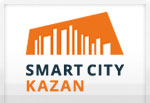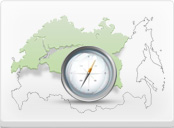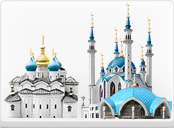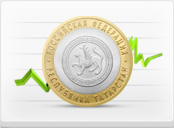Capital
.gif) The capital of the Republic of Tatarstan Kazan lies in the northwestern portion of Tatarstan along the banks of the Kazanka River at its confluence with the Volga River. It has a population of approximately 1,144,000.
The capital of the Republic of Tatarstan Kazan lies in the northwestern portion of Tatarstan along the banks of the Kazanka River at its confluence with the Volga River. It has a population of approximately 1,144,000.
The Mayor of Kazan is Ilsur Metshin.
The capital of Tatarstan is a big railway, motorway and airway hub and one of the largest river ports on the Volga.
Metro opened in Kazan in 2005.
Main industries include machine engineering and metalwork, aircraft construction and instrument engineering, petrochemistry, textile and food processing.
Kazan manufactures helicopters (JSC Kazan Helicopters), aircrafts (KMPO, KAPO n.a. Gorbunov), compressor and refrigeration equipment (Kompressormash), polyethylene (Kazanorgsintez), synthetic rubbers (Kazan plant of synthetic rubber), medical (KMIZ) and optical instruments (KOMZ), detergents (Nefis-cosmetics) and drugs (Tatkhimfarmpreparaty). Most of the produce is made for export.
Kazan is also a large science and research center. Kazan Federal University, the second oldest university in the Russian Federation, was established in 1804. Kazan State Technological University and Kazan State Technical University have the status of national research universities. Altogether Kazan has 39 higher education establishments, the Tatarstan Academy of Sciences, the Kazan Scientific Centre of the Russian Academy of Sciences and several science and research institutions.
The Kazan Kremlin, the chief historic citadel of Kazan, was declared a World Heritage Site in 2000. The city boasts a registered brand of the "sports capital of Russia".
Kazan is proud of many outstanding people who lived and worked here including Nikolai Lobachevsky, Aleksandr Butlerov, Nikolai Zinin, Leo Tolstoy, Sergei Aksakov, Gavriil Derzhavin, Mikhail Balakirev, Mikhail Shchepkin, Vekimir Khlebnikov, Feodor Chaliapin, Nikolai Feshin, Vasily Kachalov and Peter Lesgaft.
The Tatar culture also has its prominent representatives who created their masterpieces in Kazan: Kayum Nasyri, Shigabutdin Mardzhani, Gabdulla Tukai, Musa Jalil, Salikh Saidashev, Farid Yarullin, etc.
Kazan is a multi-faith city with mosques, Orthodox churches, Lutheran and Catholic churches, a synagogue, a theological seminary and Russian Islamic University.
 As Kazan is a city with fine cultural traditions, music lovers will find here Russia’s second in size concert hall, a philharmonic hall, an opera house, drama and puppet theatres, four state concerts, a dance and song ensemble, etc. Children and young people attend secondary and higher educational establishments of culture and arts.
As Kazan is a city with fine cultural traditions, music lovers will find here Russia’s second in size concert hall, a philharmonic hall, an opera house, drama and puppet theatres, four state concerts, a dance and song ensemble, etc. Children and young people attend secondary and higher educational establishments of culture and arts.
Kazan hosts large international and national events such as the Feodor Chaliapin International Opera Festival, the Rudolf Nuriev International Classical Ballet Festival, the Europe-Asia Contemporary Music Festival, the Kazan International Muslim Film Festival. It staged the Nauruz International Theatre Festival of Turkic Peoples for several times. Cirque du Soleil came to Kazan twice.
The recent years have seen large-scale construction resulting in the new transport infrastructure and many new sport venues being put up. Kazan offers two water parks, Riviera being Russia’s largest and one of Europe’s biggest.
World Summer Universiade was held in the capital of the Republic of Tatarstan in 2013.
Kazan will also stage the FINA World Championships in 2015 and the World Cup matches in 2018.
Kazan was named the sports capital of Russia, following the national voting organized by the Russian Sports, Tourism and Youth Policy Ministry. In Russian, European and world competitions Kazan is represented by Ak Bars hockey club, Rubin-Kazan football club, Unics basketball club, Dinamo-Kazan bandy team, Zenit-Kazan volleyball club and others.
Kazan is one of top tourist destinations in the Russian Federation. 1 billion people visit Tatarstan capital every year.
The city where representatives of various faiths and ethnic backgrounds live in harmony and peace welcomes guests from around the world.

-
 Educational portal of RT
Educational portal of RT
-
 Investment portal of RT
Investment portal of RT
-
 SMART City Kazan
SMART City Kazan
-
 State Television and Radio Broadcasting Company "Tatarstan"
State Television and Radio Broadcasting Company "Tatarstan"
-
 Online services of Russian Pension Fund
Online services of Russian Pension Fund
-
 45th WorldSkills Competition 2019
45th WorldSkills Competition 2019
-
 Fund «Yanarysh»
Fund «Yanarysh»
-
 Business centre of RT
Business centre of RT
-
 The City of Kazan
The City of Kazan
-
 Kazan City Tourist Portal
Kazan City Tourist Portal
-
 Tatarstan Book House
Tatarstan Book House







